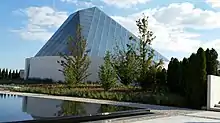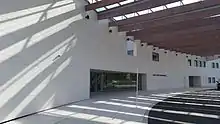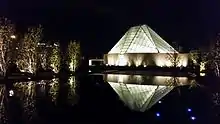Ismaili Centre, Toronto
The Ismaili Centre, Toronto is a mosque (Jama'at Khana) and community centre in Toronto, Ontario, CA Canada, the sixth such Ismaili Centre in the world. Situated in a park that it shares with the Aga Khan Museum adjacent to the Don Valley Parkway in North York, Toronto, Ontario, Canada, the Centre represents the permanent presence of the Ismaili Muslim community in Toronto, Ontario and Canada. The building was opened by Canadian Prime Minister Stephen Harper and His Highness Prince Karim Aga Khan on September 12, 2014.[1]
| The Ismaili Centre, Toronto | |
|---|---|
 The glass roof of the Ismaili Centre, Toronto's distinctive prayer hall. | |
| Religion | |
| Affiliation | Shia Imami Nizari Ismaili Islam |
| Leadership | Aga Khan IV |
| Location | |
| Location | 49 Wynford Drive, Toronto, Ontario, Canada |
| Architecture | |
| Architect(s) | Charles Correa Associates |
| Type | Jama'at Khana |
| Groundbreaking | May 28, 2010 |
| Completed | 2014 |
| Website | |
| http://www.theismaili.org/ismailicentre/toronto | |


Construction and development
The Ismaili Centre, Toronto is situated along Wynford Drive in Toronto's Don Mills neighbourhood.[2] It is visible from the adjacent Don Valley Parkway,[3] and shares a 6.8 hectare site with the Aga Khan Museum.[2] The two buildings are surrounded by a landscaped park.[3]
Formally announced in 2002,[4] the Ismaili Centre had its foundation ceremony on May 28, 2010. The ceremony was performed by Canadian Prime Minister Stephen Harper and the Aga Khan, together with the foundation of the Aga Khan Museum and their shared park.[1] Construction of the $300 million development finished in 2014, and represents a significant addition and shift in the landscape of Toronto's cultural institutions.[5]
Architecture
The Ismaili Centre, Toronto was designed by Indian architectural firm Charles Correa Associates in collaboration with Toronto-based Moriyama & Teshima Architects. A distinguishing feature of the building is the glass roof of the prayer hall, which recalls the corbelling in many of the traditional domes in the Muslim world.[6] The glass dome, which represented a difficult technical challenge, is made of two layers of high-performance glass, and fritted (made porous) to deflect the heat of the sun. A clear sliver of glass facing east toward Mecca will run down the translucent roof.[7]
The Park
The Ismaili Centre is set in a landscaped park, composed of both formal and informal gardens. Designed by Lebanese landscape-architect Vladimir Djurovic, the park connects the Centre with the adjacent Aga Khan Museum. Djurovic described his vision for the park as one that "captures the essence of the Islamic garden and translates it into an expression that reflects its context and contemporary age."[6]
Designed to suit the climate of Toronto, the gardens capture the beauty of the four seasons.[2] The park also provides space for educational programming, outdoor gatherings, as well as offering areas for tranquillity and relaxation.[6]
References
- "Opening of the Ismaili Centre, Toronto". The Ismaili. Retrieved June 17, 2016.
Mawlana Hazar Imam and Prime Minister Stephen Harper unveil a plaque commemorating the opening of the Ismaili Centre, Toronto.
- "Mawlana Hazar Imam is awarded Honorary Canadian Citizenship as he is joined by Prime Minister for Foundation Ceremony in Toronto". TheIsmaili.org. May 28, 2010. Retrieved May 28, 2010.
- Tamizan Esmail and Nikhat Ahmed (May 26, 2010). "New chapter in Canadian Ismaili story set to unfold in the Don Mills neighbourhood of Toronto". TheIsmaili.org. Retrieved May 31, 2010.
- "Archived copy". Archived from the original on December 7, 2008. Retrieved April 28, 2009.CS1 maint: archived copy as title (link)
- Christopher Hume (May 28, 2010). "Complex backed by Aga Khan will bring new life to urban neighbourhoods". Toronto Star.
- "Ismaili Centre Toronto" (PDF). The Ismaili. Archived from the original (PDF) on April 11, 2014. Retrieved June 17, 2016.
- Lisa Rochon (May 27, 2010). "Complex backed by Aga Khan will bring new life to urban neighbourhoods". The Globe and Mail. Retrieved May 31, 2010.
External links
| Wikimedia Commons has media related to Ismaili Centre, Toronto. |
- www.islamabc.org
- "The Ismaili Centre, Toronto". Retrieved May 31, 2010.
- "Official site of the Ismaili Centres". Retrieved May 31, 2010.
- Aga Khan Museum Added December 28, 2012
- Ismaili Centre Toronto - Moriyama & Teshima architects Added December 28, 2012